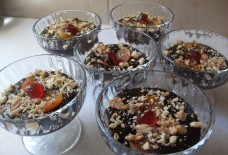Emirati Cuisine: The Melting Pot of the Middle East
BY: David DeMaria/Contributing Writer
The United Arab Emirates may be best known as a travel destination for tourists looking for luxurious hotel stays in cities such as Dubai (دبي), Abu Dhabi (أبو ظبي), and Sharjah (الشارقة), but one of the most overlooked qualities of the desert nation is its culinary cosmopolitanism.
Due to the desert climate, much of the traditional food in the Emirates uses much meat, grain, and dairy. Vegetables can be grown in some areas, as well. Traditional Emirati dishes include the likes of Maq’louba (مقلوبة) which is a traditional Arab dish featuring meat, rice, and fried vegetables placed in a pot and flipped upside down, which is the literal translation of the dish.
Another popular traditional dish is Harees (هريس) which consists of boiled, cracked, or coarsely-ground wheat, mixed with meat, and has a consistency between porridge and a dumpling. It is an especially popular dish during the month of Ramadan.
Makbous (مكبوس) or Kabsa (كبسة) is a dish indigenous to Saudi Arabia, but it is often served in the Emirates. There are various ways of preparing Makbous, but it is generally made with basmati rice, meat, vegetables, and a mixture of spices.
Meats that are used frequently in Emirati food include fish, chicken, goat, lamb and mutton, and beef. Camel meat is consumed (لحم الجمل) on special occasions.
Spices are an important addition to most traditional Emirati cuisine. Saffron, cardamom, turmeric, and thyme are the most common accents of Emirati cooking.
A famous Emirati dessert option is Khabeesa (الخبيص) which consists of flour bread crumbs blended with sugar, cardamom, and saffron. Dessert is typically served with a red tea infused with mint, and may also be accompanied by dates and Arab coffee (قهوة عربية). Other popular beverages include fruit juice and camel’s milk (حليب الجمل).
Alcohol is served in hotel restaurants and bars, except in Sharjah. All nightclubs and golf clubs are permitted to sell alcohol.
The Dubai Food Festival held each year solidifies Dubai’s position as the leading culinary capital of the Middle East. The festival showcases a variety of flavors and cuisines available in the city, featuring the cuisines of over 200 nationalities.
In the UAE, there is a wonderful culinary history made famous by traditional Middle Eastern cuisine. The Emirates also offer Arabs a window to the rest of the world, with an assortment of international options available in each of three major Emirati cities. In Dubai, you could eat traditional Arab cuisine one night and sushi the next, pizza on Friday, and a burger on Saturday. The level of culinary diversity adds something new and unique to the country, creating the perfect blend of tradition and global influence.


